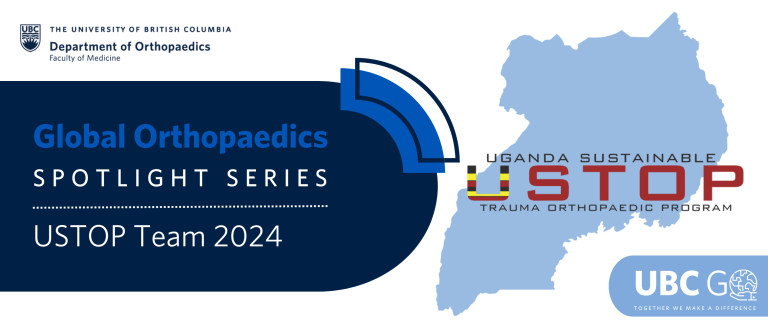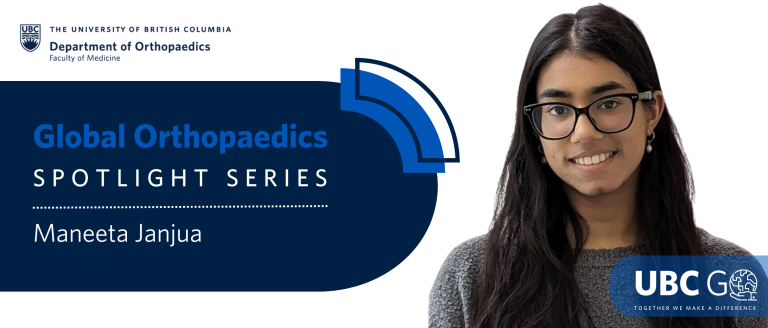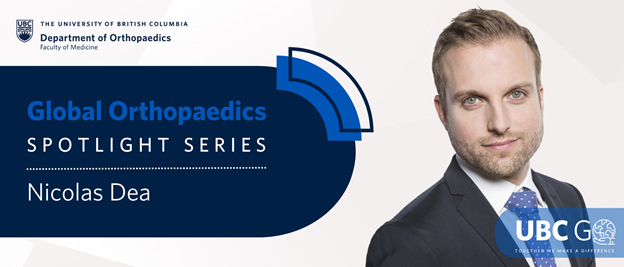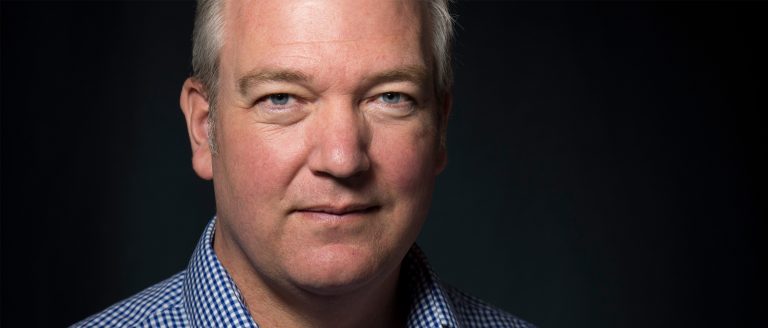Our UBC Global Orthopaedics (UBC GO) Spotlight series features in-depth conversations with UBC Department of Orthopaedics members about their involvement in global orthopaedic initiatives.
In this special spotlight, we learn about the 2024 USTOP team, highlighting their unique experiences and discoveries from the trip.
This year, USTOP (Uganda Sustainable Trauma Orthopaedic Program) celebrates the relaunch of its trip after the COVID-19 pandemic, continuing its mission to advance orthopaedic care in Uganda through education, research, and clinical outreach.
As a collaborative effort, USTOP brings together a passionate team of surgeons, nurses, and physical therapists from institutions, including UBC and McMaster University. Their shared goal? To provide sustainable orthopaedic care through local capacity-building and hands-on education.

Voices from the field: reflections from USTOP team members
“Compared to what we saw years ago, things are improving, but there’s still much more work to be done. USTOP plays a crucial role in education, which leaves a lasting impact. However, the Ugandan healthcare system faces ongoing challenges, like a shortage of physical therapists and inefficient post-operative care. The relationships we’ve built through continuous collaboration make organizing trips easier and ensure access to key Ugandan healthcare workers.” — Maureen Duggan, physiotherapist
“Being part of USTOP allows me to share my knowledge with people who don’t have the same opportunities. Operating in Uganda pushes me out of my comfort zone and reminds me why I became a surgeon—to make a difference. Despite the challenges, like implant shortages and delayed care, I find satisfaction knowing that our involvement creates sustainable change. It’s also been valuable for me personally, as I’ve learned to adapt surgical techniques to low-resource settings.” —Phil Hache, orthopaedic trauma fellow
“There’s a lot of orthopaedic trauma that goes untreated in Uganda due to affordability issues, especially since surgeries are delayed when patients can’t pay for implants. USTOP’s focus on training residents and modelling best practices in the operating room helps improve care despite these limitations. I love working with the Ugandan team because I know the knowledge we share will lead to better patient outcomes. But we need a more constant presence—our twice-a-year visits are not enough.”— Audrey Hiebert, nurse
“The healthcare challenges in Uganda are multifaceted—there are funding issues, limited access to care, and a lack of coordination between professionals like surgeons and physiotherapists. What makes USTOP rewarding is the ability to engage directly with local healthcare providers and help develop their clinical reasoning. Over time, we’ve built a strong partnership, but consistency is key. If we can expand our teaching presence virtually, it will help sustain the progress we’ve made.” — Lisette Cheng, physiotherapist
“The public healthcare system struggles with limited implant availability and poor OR infrastructure. One key improvement we’ve achieved is creating a network of graduates who go back to their local communities with the skills we’ve taught. However, USTOP must focus on sustainable partnerships and provide tools like implant testing and equipment connections. Education is vital, but we also need to help improve infrastructure and establish sustainable solutions.” — Brad Petrisor, orthopaedic trauma surgeon
“The healthcare system has come a long way, but challenges like limited sterilization, outdated methods, and insufficient staffing persist. We’ve made progress by showing commitment and building trust with local partners, which gives us influence in decision-making. Moving forward, USTOP needs to focus on high-quality courses and assign pre-course preparation for residents to maximize the time we spend on-site.” — Ghassan Alami, consultant orthopaedic surgeon
“Healthcare in Uganda has improved, but the gap between available resources and patient needs remains large. Many surgeries are delayed due to a lack of supplies, and essential nursing education is still evolving. USTOP’s focus on teaching aseptic techniques and essential OR skills have made a difference. The relationships we’ve built are invaluable, and they motivate me to stay involved and continue making an impact.” — Regina Kim, nurse
“Despite some improvements, the Ugandan healthcare system is not reaching its full potential due to inefficient use of resources and challenges like long delays in care. What keeps me engaged with USTOP is the opportunity to provide mentorship and education. It’s incredibly rewarding to see how knowledge shared during these missions continues to benefit healthcare workers and their patients long after we’ve left.” — Tanis Worth, year-5 resident in orthopaedic surgery
Facing the challenges head-on
Over the last 15 years, USTOP has made significant progress, but challenges remain. Limited access to essential supplies such as implants, shortages of anesthesiologists, and gaps in post-operative care continue to affect healthcare delivery in Uganda. However, the focus on long-term education and partnerships helps empower local professionals to address these challenges. USTOP’s involvement strengthens these efforts by providing targeted workshops and virtual learning opportunities tailored to the realities on the ground.
Strengthening sustainability for the future
For this trip in particular, the team coordinated biweekly teaching sessions and online case discussions, ensuring that local healthcare providers received the support they needed even before USTOP’s in-person training sessions.
Looking ahead, USTOP aims to expand virtual programs and mentorship initiatives, empowering Ugandan healthcare providers to take the lead in local training. With a focus on sustainable development, the program seeks to build stronger in-country leadership to improve orthopaedic care with minimal reliance on external teams. Tailored learning modules and hands-on training will address the specific needs of Ugandan healthcare providers, ensuring a lasting impact.
A shared mission for global health
USTOP’s mission reflects the power of global collaboration in transforming healthcare. By investing in education, research, and clinical outreach, the program ensures that the knowledge shared today will lead to better outcomes tomorrow. The reflections from the team members highlights the importance of creating sustainable solutions and fostering connections that transcend borders, leaving a lasting impact on both the Ugandan healthcare system and the global medical community.
This year’s USTOP mission exemplifies how partnerships, education, and innovation can create meaningful change—one workshop, one surgery, and one connection at a time.
Learn more about USTOP and UBC Global Orthopaedics.






